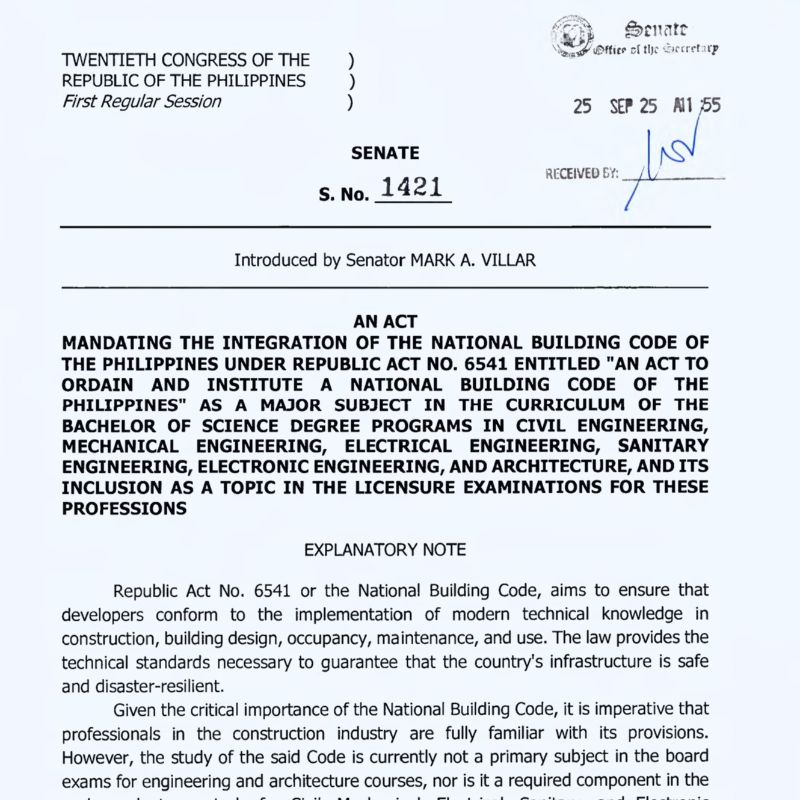Proposed Senate Bill 1421 Pushes for National Building Code Integration in Curriculum and Board Exams
The Philippine Senate is currently deliberating Senate Bill No. 1421, introduced by Senator Mark Villar, which seeks to mandate the integration of the National Building Code of the Philippines (NBCP) into the curriculum of engineering and architecture degree programs. Under this proposed measure, the NBCP—formally known as Republic Act 6541, “An Act to Ordain and Institute a National Building Code of the Philippines”—would become a major subject in Bachelor of Science programs such as: Civil Engineering, Mechanical Engineering, Electrical Engineering, Sanitary Engineering, Electronic Engineering, and Architecture. Moreover, the bill recommends that knowledge of the NBCP be included as part of the licensure examinations for these professions.

The Philippine Senate is currently deliberating Senate Bill No. 1421, introduced by Senator Mark Villar, which seeks to mandate the integration of the National Building Code of the Philippines (NBCP) into the curriculum of engineering and architecture degree programs.
Under this proposed measure, the NBCP—formally known as Republic Act 6541, “An Act to Ordain and Institute a National Building Code of the Philippines”—would become a major subject in Bachelor of Science programs such as:
Civil Engineering
Mechanical Engineering
Electrical Engineering
Sanitary Engineering
Electronic Engineering
Architecture
Moreover, the bill recommends that knowledge of the NBCP be included as part of the licensure examinations for these professions.
Why is this Important?
The NBCP, first enacted in 1972 and updated through Presidential Decree 1096, sets the minimum standards for building design, construction, occupancy, and maintenance in the Philippines. It is the foundation of structural safety, particularly against earthquakes, fires, typhoons, and other hazards.
By formally integrating it into the academic curriculum, future engineers and architects would not only gain a deeper understanding of construction regulations, but also be better prepared to design and implement safer, compliant, and resilient structures. Including it in the licensure exams would reinforce its importance in professional practice.
Current CHED Civil Engineering Curriculum
Under the CHED Memorandum Order No. 92, s. 2017, which outlines the current BS Civil Engineering curriculum, the National Building Code is not a standalone subject.
The NBCP is taught in parts, embedded within courses such as Structural Design, Construction Management, Building Design, and Professional Practice.
This means students already encounter the NBCP, but depth and consistency vary across universities. Some schools may integrate it heavily in design projects, while others only touch on selected provisions.
This is where SBN 1421 comes in: the bill aims to elevate the NBCP into a dedicated major subject across engineering and architecture programs, ensuring uniform coverage nationwide and making it a required component in licensure examinations.
Current Status of SBN 1421
As of September 30, 2025, SBN 1421 is still pending at the committee level in the Senate. The measure has been referred to the Committees on Higher, Technical and Vocational Education; and on Civil Service, Government Reorganization and Professional Regulation.
Meanwhile, broader efforts to modernize the National Building Code continue. The House of Representatives approved House Bill 8500 (Philippine Building Act) on third and final reading in August 2023, while other senators have filed separate bills aimed at updating building regulations to address disaster resilience, sustainability, and public safety.
As a Major Subject and Licensure Examination
This proposal highlights a pressing question: Should future engineers and architects undergo mandatory formal training on the National Building Code as part of their degree programs?
Many industry experts argue that early exposure will better equip students for real-world practice, while others caution about the challenge of curriculum overload in already demanding degree programs.
Should the National Building Code of the Philippines become a major subject in engineering and architecture courses, and be part of the licensure examinations?
Senate Bill: https://web.senate.gov.ph/lis/bill_res.aspx?congress=20&q=SBN-1421